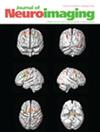Sex differences in development of functional connections in the face processing network
Abstract
Background and Purpose
Understanding sex differences in typical development of the face processing network is important for elucidating disruptions during atypical development in sex-linked developmental disorders like autism spectrum disorder. Based on prior sex difference studies in other cognitive domains, this study examined whether females show increased integration of core and extended face regions with age for face viewing, while males would show increased segregation.
Methods
This study used a cross-sectional design with typically developing children and adults (n = 133) and a functional MRI face localizer task. Psychophysiological interaction (PPI) analysis examined functional connectivity between canonical and extended face processing network regions with age, with greater segregation indexed by decreased core-extended region connectivity with age and greater integration indexed by increased core-extended region connectivity with age.
Results
PPI analysis confirmed increased segregation for males—right fusiform face area (FFA) coupling to right inferior frontal gyrus (IFG) opercular when viewing faces and left amygdala when viewing objects decreased with age. Females showed increased integration with age (increased coupling of the right FFA to right IFG opercular region and right occipital face area [OFA] to right IFG orbital when viewing faces and objects, respectively) and increased segregation (decreased coupling with age of the right OFA with IFG opercular region when viewing faces).
Conclusions
Development of core and extended face processing network connectivity follows sexually dimorphic paths. These differential changes mostly occur across childhood and adolescence, with males experiencing segregation and females both segregation and integration changes in connectivity.

 求助内容:
求助内容: 应助结果提醒方式:
应助结果提醒方式:


